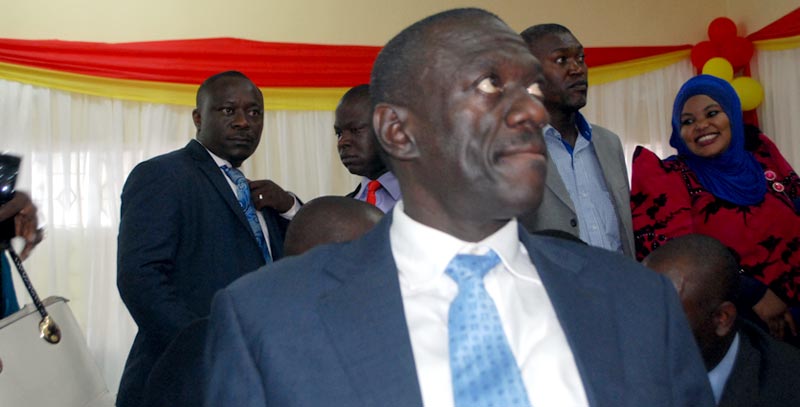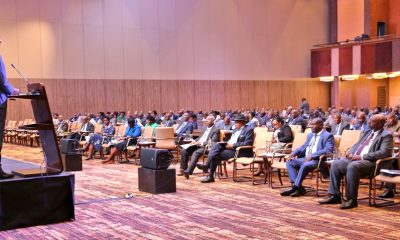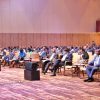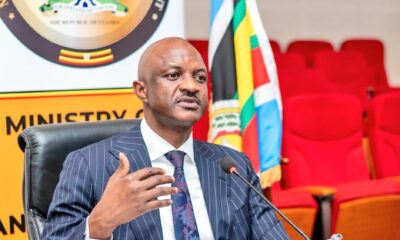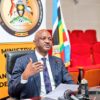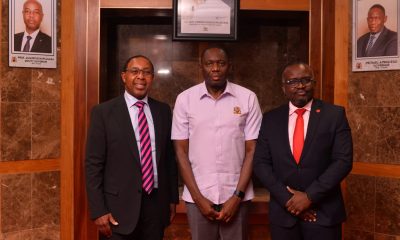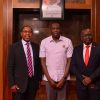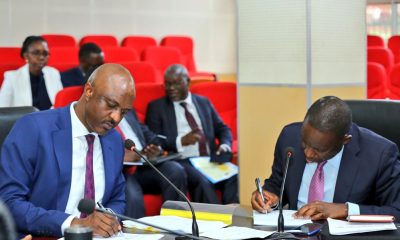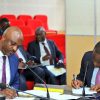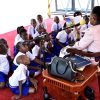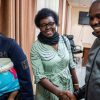Columnists
Besigye wins; Museveni rules!
Why do we enjoy to carryout experiments whose results we already know?
Campaigns have begun. Work and production have gone with the waves of political excitement. This week began with the battle on “who has the biggest crowds?” Like it was in 1996 and 2006, when Paul Kawanga Ssemwogerere and Kizza Besigye respectively won the bragging rights over the incumbent, by showcasing massive crowds at nomination day, Besigye once again comfortably won this battle. Kampala stopped as Besigye’s supporters snaked the streets from Namboole Stadium (where nominations took place) to Nakivubo Stadium (where he held his first campaign rally).
I could see that happiness and excitement nearly ‘killed’ Besigye while addressing the mammoth crowds that attended his post-nomination rally. “I feel all the energy; I feel it all over my body,” he said. The previous day, Mbabazi had addressed his supporters in the same stadium. He also, bragged about the crowds he had pulled in Eastern Uganda (Mbale, Kapchorwa, Soroti, and Jinja) and on his nomination rally.
For years I have written in these pages wondering why on earth Ugandans loved to carry out experiments whose results they already knew. True, Besigye got the largest crowd, although I believe it was not as large as the crowds that received him from the High Court in 2006 when he was released from jail.
On January 2, 2006, I was at the former Greenland Bank building, in front of Bank of Uganda, when people from all directions came to receive Besigye from the High Court premises above Central Police Station (CPS). I unexpectedly found myself at Jinja Road without any intention of going there. How did I reach there?
The crowds, that filled all roads and buildings along Kampala Road and the surrounding streets, were packed body-to-body and inadvertently shoved me in the direction they were heading. If there’s anything like mammoth crowds, Besigye had mammoth crowds in 2006. Did Besigye win the election? Well, according to Gen. David Sejjusa, yes he did. Did he become President? Of course not.
Failed negotiations
True, the writing is on the wall that the current government has weakened tremendously. The incumbent has lately been prevailing over a dysfunctional state — scarcely delivering the services Ugandans expect the state to provide, particularly jobs, quality healthcare, quality education, and others.
True, many young people are cursing why they were born in a wrong country — a country that cannot create descent jobs for most of them. True, corruption is nearly institutionalised.
Granted, the economy has gone into comma with the shilling having lost over 25% of its value in the past one year. Granted, the incumbent has ‘overstayed’ to the liking of quite many Ugandans, including even some of his erstwhile best friends and admirers.
But wait a minute, haven’t we heard about these facts before? Every five years since 2001, we have seen big crowds following Besigye. Every five years, we have seen a big NRM cadre leaving Museveni’s camp — Besigye in 2001; Jabeli Bidandi Ssali and the late Eria Ketegaya in 2006; Gilbert Bukenya in 2011; and now Mbabazi.
Every five years, we have witnessed failed negotiations among the opposition parties and politicians to form a meaningful coalition so that their united voice could reach all corners of the country to rally voters against a ‘weakened’ NRM. Just five years ago, the major opposition parties — FDC, UPC and DP — failed to agree to form a coalition.
Five years later, the FDC party leaders stand in Nakivubo Stadium chest thumping, feeling the energy created by the big crowd before them. They refused to work with Mbabazi and others in The Democratic Alliance (TDA) to field a single candidate with measurable chances of winning both the election and power.
Their belief and calculation is that with both Mbabazi and Besigye standing, and with both fully leveraging people’s frustration and own their support bases, they might force a rerun when the incumbent fails to win the constitutional 50 plus 1 percent. They forget a number of things.
Personal vs public interests
First, by refusing to work with Mbabazi, Besigye forgot that in Uganda, just like in many other poor countries, election victory is based on the ability by the candidate to convince people that when they give you their votes you will go ahead and actually take the power.
The disbelief in popular support alone started in 1980 when DP’s Ssemwogerere won but UPC’s Milton Obote became President. When electoral politics returned in 1996, many of DP’s big shots abandoned Ssemwogerere for President Museveni.
It was Besigye who had restored some confidence in people in 2001. As a newly retired colonel, speaking with authority and conviction, people right away fell in love with Besigye. They thought that unlike Ssemwogerere, Besigye knew Museveni better and had the wherewithal, given his military background, to wrestle Museveni out of State House. It doesn’t need a genius to know that this confidence has now shifted to Mbabazi, especially following Sejjusa’s unconfirmed revelation that Besigye actually won the election in 2006.
Besigye is trying to circumvent this conundrum by telling his supporters that this time round, he is going to run a “campaign of defiance” instead of looking for votes. In my view, this might confuse his supporters more. By implication, Besigye is in the race, not to get the most votes and win power, as the constitution requires.
Instead, he is in the race to use the occasion either to mobilise his supporters to march to State House and force the incumbent out, or simply to defy the government in whichever form to satisfy their ego.
But isn’t this synonymous with playing in the incumbent’s hands? If Museveni gets declared winner of the election in February, how else will the defiant FDC get the power? Why not work with all others to overwhelm Museveni and the NRM with support, win the race and cause whatever trouble from that point?
In my view the current composition of the 2016 presidential race gives the incumbent an advantage. First of all, the fact that all the three main candidates plus Biraaro and Baryamureeba come from the west, divides the sectarian vote (which is a reality) to advantage of the incumbent.
Secondly, Mbabazi is going to eat into Besigye’s support (particularly the elite) more than he will eat into Museveni’s. Why? First, many of the educated younger and older voters feel that Mbabazi is more presidential than Besigye. Second, many people in NRM who are seated on the fence could only vote for Mbabazi if they were sure that he would win. Now that they are not sure, they will vote for continuity.
One thing opposition politicians in Uganda forget is the fact that elections are based more on addressing personal interests as opposed to public interest. Poor people don’t care more about other things other than bread. That is why they can erase a forest to grow food.
In Uganda few people still take manifestos of politicians, whether for the incumbent or for opposition, seriously. People now simply cater for their interests. They vote for those who are capable of serving their personal interests.
Discouraging utterances
I strongly believe that, despite the adverts, seminars, and other forms of communication that NGOs have been sponsoring to educate the voters to vote for “issues” as opposed to “gifts”, the winners of the February 18th poll will be those that will have “treated voters” on freebies such as money, sugar, food, sodas, alcohol and other groceries. Quite unfortunate but true. Of course there may be some few exceptions.
The moral talk of “eat the money but vote wisely” is simply academic in poor societies. People don’t listen to such messages. Reason? Ugandans have come to realise that politicians are the same. They are the last people to trust. In any case the three top candidates in the forthcoming race were close friends and allies.Their point of departure was primarily power sharing. No wonder voters now behave like a dog — rummage around for your share when the master is still in a generous mood.
More importantly, over the past couple of elections, the opposition has worked hard to undermine their supporter’s confidence and obliterate the trust in the electoral process. Many voters now feel that the probability that their votes could determine the outcome of the election is insignificant.
At Nakivubo this week, Besigye told his supporters that they don’t have any power to decide the outcome. “You overwhelmingly voted for the Lord Mayor Erias Lukwago; is he in City Hall?” he asked. I guess Museveni must have punched the air.
Although what Besigye is saying holds a lot of water, coming from a man who had just faced Badru Kigundu’s panel was not strategic at all. Let me be clear, while the democratic option to change power in Uganda sounds unrealistic, it is at the same time the only viable one.
The so-called civil disobedience is neither attractive nor possible in the current Uganda. Many people, especially the power brokers (in politics, in the military, the media, clergy, investors and cultural leaders) as well as the elite, will not support violence. They have more to lose than to gain in violence. They have accumulated some wealth (both material and human capital).
The last thing the people of Uganda would want to participate in is violence, their frustrations with the prevailing political environment notwithstanding. Let the events elsewhere (in Egypt, Tunisia, Ivory Coast, Burkina Faso, etc) not dupe Besigye and his friends. One of the most important lessons of the past four decades is that everywhere is different. Local context matters! A lot.
Comments



